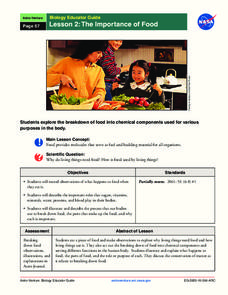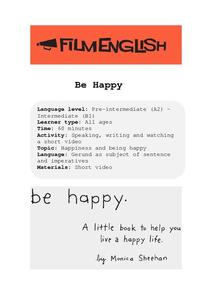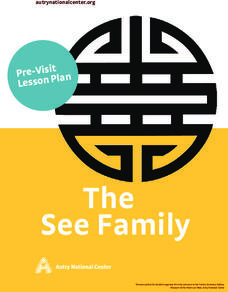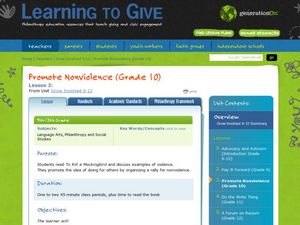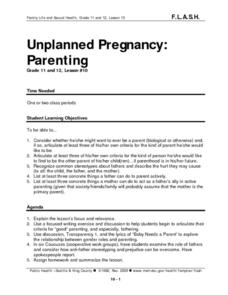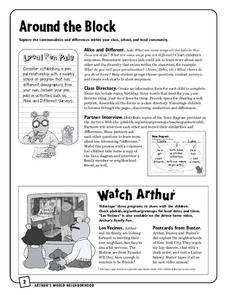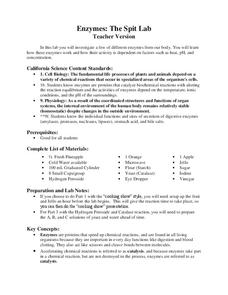Curated OER
What is Life?
Students investigate living and non-living organisms/objects foudn around the school in this technology-based science lesson. Adjustments to the lesson can be made based upon technological limitations.
Curated OER
Life Cycles
Using computers, Students work in small groups and progress through the roles of Explorer, Researcher, Designer, and Evaluator as they study the life cycle of plants, insects, butterflies and frogs.
Curated OER
Plants And Animals in the Local Environment
Pupils observe the various living things they can find outside their playground making sure to look both on the ground and in the air. They develop a large poster Venn digram, as a class, of plants and animals that live in the air, on...
Curated OER
The History of Life
In this history of life activity, students complete a crossword puzzle by figuring out the vocabulary words associated with the 11 clues given. Then students review how paleontologists use fossils to learn more about past living things...
Curated OER
Oil + Water + Wildlife = A Real Mess
Middle schoolers conduct an experiment. In this environmental protection lesson, students explore how oil spills affect living organisms in an ecosystem. Middle schoolers work in groups to complete a lab activity and then discuss their...
Curated OER
Growing Plants
Students explore plants and recognize that they are living things that require light and water to grow. In this online plant biology lesson, students identify, name and match the parts of plants. Extension activities and suggested...
NASA
The Importance of Food
Pupils make observations while eating food. They act out the process of food breaking down in the body and the roles of various chemical components, such as sugar and protein. It concludes with an activity illustrating the process and a...
Film English
Be Happy
What makes your pupils happy? Find out with a lesson centered around this theme. Class members come up with things that make them happy and write about them in preparation for quick group project. Learners watch and discuss a short film...
K12 Reader
Location, Location, Location
Why do some places in the world have more people living there than other places? Learn about the ways the countries have formed around natural resources with a reading comprehension activity. After kids read a short passage, they answer...
Curated OER
The Celts
Look far back in history and you'll meet a people group called the Celts. Celts, as you'll soon find out, are a group of people who inhabited Britain 2000 years ago. Presented here, is simple information which describes a bit about...
Curated OER
Dandelion Wine: Socratic Seminar
There are “a million things to talk about. . .” in Ray Bradbury’s Dandelion Wine; however, the focus of this socratic seminar is the issue of living and dying. Class members prepare for the discussion by writing about their own views of...
Polar Trec
Arctic Smorgasbord!
Two blooms of phytoplankton, instead of just one, now occur in the Arctic due to declining sea ice, which will have widespread effects on the marine life and climate. In small groups, participants build an Arctic food web with given...
Have Fun Teaching
12 Months of Daily Journal Prompts
Imagine a packet of 365 colorfully illustrated journal prompt templates, grouped by month, that recognize themes, holidays, and events. Here 'tis, imagine that.
Curated OER
Lesson: Urs Fischer: Reviving the Past Art Movements
Seven major abstract art movements are analyzed by learners in groups. Each group analyzes various works by determining which work belongs to which movement. They then read Flatland, engage in an art and literary analysis discussion,...
Curated OER
The See Family
Third graders examine photographs as primary source documents. Students are broken into groups and are given photographs of the See Family.
Curated OER
Promote Nonviolence
Take a look at the topic of violence as seen in Harper Lee's To Kill a Mockingbird. Discuss together the values that Atticus holds and brainstorm ways to combat violence in a similar manner to what he portrays in the novel. Get your...
Curated OER
Unplanned Pregnancy: Parenting
High schoolers consider and discuss characteristics of an ideal parent. In small groups, they work together to examine the stereotypical roles of the father and the mother. The issues dealt with in this resource are thought-provoking and...
Chicago Botanic Garden
Introducing Ecosystem Services
Ecosystems provide many things humans not only use but also need in order to survive. The last instructional activity in the series of seven introduces scholars to the idea of ecosystem services, that ecosystems provide humans with many...
American Museum of Natural History
Gusty: The Gut Microbiome Card Game
Build up your gut. Groups up to four play a card game to learn more about the microbiome in the gut. Learners try to build a healthy gut with their cards. The player acquiring six microbes without any pathogens wins the game.
Curated OER
Follow the Leader
What are the qualities of a good leader? Of a good follower? A reading of Leo Lionni’s Swimmy launches a discussion of leadership and cooperation. Class members brainstorm how they can be leaders at home and how they can encourage others...
Curated OER
Electricity
Learners explore where electricity comes from and how it is used in their everyday lives. Through discussion and hands-on activities, they define electricity and explain how it travels to our homes. Students make informed choices based...
PBS
Around the Block
Arthur and his friends help children explore the concepts of family, community, and diversity in a fun series of activities. From performing peer interviews to mapping out the different places students have lived or visited, this...
Houghton Mifflin Harcourt
Look at Us!: Challenge Activities (Theme 1)
Challenge your advanced learners with this set of activities based around a common theme. Learners draw, research, share, retell stories, compare and contrast, and more over the course of these activities, which focus mostly on animals...
LABScI
Enzymes: The Spit Lab
Enzymes in our bodies each have a job to do. Learn the factors that affect the activity of some enzymes using the third activity of an informative 12-part biology series. A three-part laboratory activity asks teams to investigate how...








